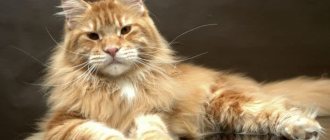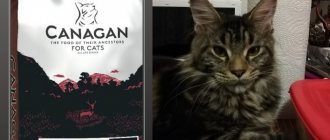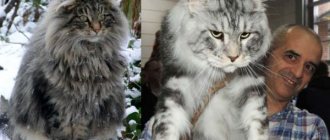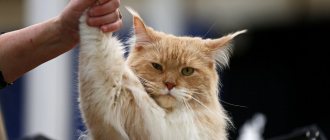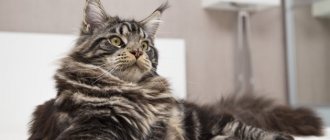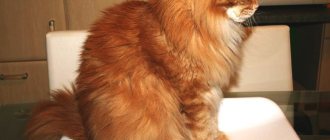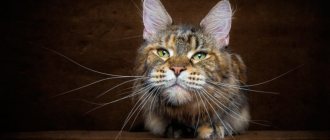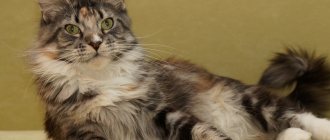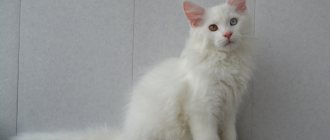The issue of feeding a small Maine Coon should be approached with special attention. The full development and stable functioning of the whole organism, appearance and ability to reproduce offspring depend on how correctly the baby’s feeding diet is selected.
The age of a kitten taken from a nursery ranges from 1.5 to 6 months (rarely up to a year) and is a period of intensive growth and development of the whole organism. This is why it is so important to provide a balanced diet for small coons.
Basic rules for feeding one-month-old kittens
Kittens of this breed feed on mother's milk longer than other feline babies - from two to two and a half months. But, as a rule, breeders begin to additionally feed one-month-old kittens with finely chopped pieces of beef or chicken.
Before taking the pet home, the owner should ask the breeder in detail what to feed one-month-old Maine Coon kittens and what foods can harm the baby.
Do not forget that kittens that have just been weaned from their mother need milk. Cow's milk is not suitable for feeding babies; it is best to feed them goat's milk or infant formula. In the first week, pets are fed mainly with milk or milk formula, occasionally adding half a teaspoon of cottage cheese and a third of raw egg yolk to their menu. Once a day, children can be given small pieces of boiled chicken or veal.
After the owner introduces a new product to the pet’s diet, he needs to observe the kitten for some time. If the baby is active and mobile, and he has no problems with the digestive system, then you can continue to feed him according to the same scheme. If the kitten is lethargic or has symptoms such as diarrhea or vomiting, the offending product should be removed from the pet’s diet.
One-month-old Maine Coon kittens should be fed at least six to seven times a day. The size of one serving should not exceed twenty to thirty grams.
What can Maine Coons do and what can’t they?
Below is a list of permitted and prohibited foods for cats of any breed, not just Maine Coons.
They are allowed:
- boiled chicken;
- boiled chicken egg yolk (can be ground with cottage cheese);
- raw quail eggs;
- boiled liver in very small quantities;
- kefir and unsweetened natural bio-yogurt without additives;
- non-acidic cottage cheese (can be added with boiled or raw chicken yolk);
- frozen chicken or beef offal.
At the same time, the correct diet for Maine Coon cats requires mandatory preliminary scalding of frozen foods with boiling water. A Maine Coon domestic cat needs:
- mineral supplements (with a natural diet);
- vitamin complexes.
However, the most correct diet for Maine Coon cats is ready-made professional food. They are perfectly balanced by the manufacturer and do not require any additional vitamin or mineral supplements. However, the choice is up to the owner. And if he has time to calculate nutrients and beneficial substances “per kilogram of weight” of a pet; cook several products separately (in small portions, because everything should be perfectly fresh); If you add a strictly measured amount of vitamins and mineral supplements, then not a single veterinarian will say a word against it.
And any Maine Coon should always have free access to fresh and clean (ideally well-filtered) water. But there is no need to boil water for a cat - it is a “dead” and absolutely useless liquid. Of course, it won't get any worse, but why waste time?
It has also been observed that Maine Coons sometimes swallow pieces of food whole without chewing, so try to give them chopped food.
Prohibited:
- pork in any form;
- bones (either fish or chicken);
- smoked products and “human” canned food;
- sugar, chocolate, any other desserts;
- raw or boiled milk;
- egg white;
- fish in any form (especially boiled pollock);
- potatoes and legumes;
- vegetable oil.
It should be borne in mind that food for Maine Coons, as well as for cats of any other breed, is not salted or peppered, nor are herbs and spices added to it. In general, felinologists and veterinarians strongly discourage feeding representatives of the domestic cat family “from the human table.” This can have an extremely negative impact on both the animal’s digestive system and its overall health.
https://www.youtube.com/watch?v=whV8wMdwUWM
Rules for feeding a kitten over two months of age
What to feed a Maine Coon kitten at 2 months? The owner should remember that the nutrition of two-month-old babies is practically no different from the nutrition of one-month-old babies. A small pet at this age also needs milk, so it should form the basis of their menu. You can start feeding your baby liquid porridges cooked with milk or infant formula.
The main food products for a furry pet at this age should be boiled pieces of meat, cottage cheese, yolk (preferably raw) and rice or semolina porridge. Portions should be increased to fifty to sixty grams per meal. Kittens are also fed five to six times a day.
Combined nutrition
If a certain diet has already been introduced, there is no need to change it often. Cats do not tolerate this well, especially when fed dry food. But if
If you need to feed your cat natural products, it is worth remembering that you cannot combine several types of food in one meal. Dry food is absorbed differently in the body than wet food, so to avoid digestive problems, it is necessary to maintain a gap of three hours between feeding different foods. Combining is not recommended, because it will not be possible to count the number of calories.
Rules for feeding a three-month-old kitten
At three months, the Maine Coon kitten has grown noticeably and is ready to begin introducing new foods into its diet. First of all, these are sea fish fillets and offal. You can also feed your older and stronger baby vegetables.
Don’t forget about milk; it is still one of the most important products for three-month-old babies. You can feed Maine Coon kittens with cereals, such as semolina, oatmeal or rice.
In addition to cottage cheese, you can diversify the diet of small pets with yogurt, fermented baked milk or natural yogurt.
One serving for a three-month-old kitten during this period should be at least seventy to eighty grams. But the feeding intensity should be gradually reduced and the pet should be fed four to five times a day.
What food should I feed my Maine Coon?
What food to feed a Maine Coon is, of course, up to the owner of the purebred pet to decide. But, if you choose dry or wet industrial food for animals, then preference should be given to professional premium products.
List of brands
The best food for Maine Coons include brands such as: “Hill's” and “lams”, “Royal Canin”, “Mars” and “Ralston Purina”. Everything is from American companies. From European manufacturers for Maine Coons, it is better to choose a special “name” breed food from “Nutro”, “Diamond Pet Foods”, “Midwestern Pet Food” or “Eagle Products”.
Pedigree kittens begin to be offered dry food at the age of 3-4 months. And you need to purchase special food “for little ones” - preferably from the products of the above companies. And by the age of one year, transfer him to “name” breed food. Ideally, it is the same brand as the “kitten food” that was given in childhood. However, each owner must choose what food to feed the Maine Coon, based on his own capabilities.
Pedigree feed lines
Experts consider special lines and “Hill's” to be one of the most optimal food options for animals of this breed. Firstly, these foods can be easily purchased today - without any interruptions in supply and in the most remote corners of our vast homeland (and this is important, because a sudden change in food is very undesirable for cats). Plus, both brands have a food option for Maine Coon kittens, developed taking into account the development of the unique exterior of these cats. In addition, it is these foods that demonstrate the most optimal price/quality combination on the modern pet market. For professional premium food (which are both Royal Canin and Hill's), the price of 200-220 rubles per pack (400 grams) is quite acceptable. It is most profitable, of course, to purchase 10 kg bags, then every 100 grams of feed will cost only 42 rubles. In addition, many retail outlets offer discounts for large volumes. But here the owner must decide exclusively, based on the capabilities of his own wallet.
Lams has a good line of dry food for Maine Coons. However, you can rarely find food of this brand in pet stores (except in two capitals, of course). The price range is approximately the same as that of Royal Canin and Hill's. The brand also has a food option for Maine Coon kittens. And many breeders prefer this particular diet for their purebred pets.
As for wet canned cat food, feeding a cat only with them is too expensive (since no self-respecting veterinarian would recommend economy class spiders) and not very correct. It is better to combine - 25% wet food + 75% dry food from 100% of the cat's daily diet. Ideally, both wet and dry food should be from the same manufacturer. Well, or at least from one class segment.
Rules for feeding a kitten aged five to six months
During this period, kittens become especially playful and active, therefore, they need more satisfying food to replenish the loss of energy reserves.
- Babies aged five to six months no longer need milk so much and it should be replaced with kefir or yogurt.
- Porridge for pets should be cooked thicker and preferably not with milk, but with water.
- Vegetables play an important role in a kitten's healthy diet, but sometimes babies are reluctant to eat carrots or pumpkin. If your pet turns up his nose at vegetables, you can use a little trick and mix them with meat.
- Maine Coon kittens are carnivores by nature, so their diet should consist of meat and offal. From offal, it is preferable to feed babies chicken stomachs, hearts or liver.
- Don’t forget about such useful products for the normal development of your furry pet as cottage cheese, eggs and sea fish. They should be on the baby’s menu at least two to three times a week.
One serving for a five to six month old kitten should contain at least one hundred to one hundred twenty grams. During this period, babies are fed three to four times a day.
Dry and wet food
It is recommended to feed with premium food because they:
- contain all the necessary nutrients and meat;
- have a long shelf life;
- convenient to transport and use;
- saves a lot of time.
Suitable food for Maine Coon is divided into the following varieties:
- holistic - food that is recommended by experts even for animals with health problems;
- super-premium class - have a balanced composition with a high percentage of meat content;
- premium class - contain vitamins and minerals in the quantities necessary for the animal.
The main disadvantage of such feeds is their high cost. Products in the form of mousses or pates should be consumed by the cat at one meal, and the leftovers should be thrown away immediately. This is due to the fact that such food quickly deteriorates when opened and becomes dangerous to the health of your furry pet.
Economical feeds do not contain enough meat and by-products and are of low quality. Long-term consumption of such foods contributes to the development of kidney, bladder and digestive tract diseases in your pet.
A list of the best brands of ready-made dry and wet food for representatives of the Maine Coon breed is highlighted.
Rating of super-premium brands
The most popular and healthy brands of food:
- Acana . A Canadian product consisting of 75% fresh meat and 25% vegetables. Contains probiotics that normalize digestive processes.
- Wildcat . German food contains 79% chicken or turkey, it also includes berries and chicken fat.
- Orijen . Canadian-made food consists of 85% poultry or fish and 15% vegetable additives. Can be fed at any age, suitable for sterilized cats. There is a line for pets suffering from excess weight.
- Applaws . Produced in the UK, contains 80% meat and 20% herbal additives.
- Optima Nova . Spanish products contain 75% animal protein and 25% natural additives.
The described foods, unlike cheaper products, do not contain potatoes, soy, grains or trans fats, and therefore do not harm the health of the pet. Maine Coon can be fed with more affordable brands: Royal Canin, Purina, Nutra Mix, but it is better to choose premium food that matches the breed.
If your pet’s health has worsened or an allergic reaction to the selected brand of food has occurred, you must urgently exclude it from the cat’s diet and select a new food, taking into account the veterinarian’s recommendations.
Some useful tips
Some owners are interested in: what is better to feed a Maine Coon kitten, ready-made food or natural food? Natural food is most suitable for feeding babies, and it is best to introduce canned food and dry granules into their diet only when they reach six months of age.
And most importantly, owners should not save money and buy cheap food for their pets, which can only harm the furry baby. When giving preference to ready-made food, you should remember that it must be of the highest quality.
One of the best options for a small, fluffy pet is to feed it SUPERPET brand raw food. This is a natural, natural and healthy food that comes frozen. It comes in two types: pieces and minced meat.
- Minced meat is best suited for kittens up to 3 months old.
- If the kitten has outgrown this age, then you can give him SUPERPET food in pieces.
Owners also need to know what foods are prohibited from feeding babies of this breed. The list of such foods includes:
- River fish and canned fish.
- Fatty meats (lamb, duck and pork).
- Foods that contain a lot of seasonings and colors, such as mashed potatoes or instant noodles.
- Eggplants and tomatoes are also not suitable for feeding Maine Coon kittens.
- All types of legumes (peas, soybeans, beans).
- Sweets and baked goods.
It is important for owners to remember that only a balanced and proper diet is the key to the health and normal development of their furry pet.
What else to see:
How to feed correctly: tips
Maine Coon kitten weight table depending on age
| Kitten age | Cat weight | Cat weight |
| Newborn kitten | 100-140 g. | 120-160 g. |
| 1 Week | 160-230 g. | 190-250 g. |
| 2 weeks | 160-230 g. | 190-250 g. |
| 3 weeks | 420-550 g. | 440-600 g. |
| 1 month/4 weeks | 560-680 g. | 630-750 g. |
| 2 months/8 weeks | 1.1-1.4 kg. | 1.2-1.5 kg. |
| 3 months/12 weeks | 1.7-2.4 kg. | 2.8-3.6 kg. |
| 4 months/16 weeks | 2.7-3.6 kg. | 3-3.8 kg. |
| 5 months/20 weeks | 2.8-3.9 kg. | 3.2-4.2 kg. |
| 6 months/24 weeks | 3.2-4 kg. | 3.8-4.5 kg. |
| 7 months | 3.6-4.7 kg. | 4.2-5.6 kg. |
| 8 months | 3.8-4.9 kg. | 4.5-6.1 kg. |
| 9 months | 4.1-5.8 kg. | 4.6-6.8 kg. |
| 10 months | 4.3-6.5 kg. | 4.8-7.2 kg. |
| 11 months | 4.3-7 kg. | 5-7.5 kg. |
| 1 year/12 months | 4.5-8.3 kg. | 5.4-8.8 kg. |
| 5 years | 5-8.5 kg. | 5.8-12 kg. |
In order for a little fluffy to grow up beautiful, healthy and active, you need to know that he should not be given food under any circumstances:
- You cannot give food from your table. No matter how the cat asks, you should not share with him: a large amount of spices, salts and carbohydrates will negatively affect the health of the animal.
- Maine Coons are not advised to give pork because it is too fatty for them, which can affect the liver.
- Maine Coon kittens should not be fed cheap dry food - their consumption leads to various diseases.
- Chicken or fish bones. The cat can easily feed, in addition, the bones clog the stomach and esophagus.
- Smoked, salted, spicy and fatty foods. Lead to gastrointestinal upset and metabolic disorders. As a result, the animal's appearance suffers and chronic diseases can develop.
- Sweets - cakes, chocolate, sugar, candy. Weakens the immune system, dulls the coat, disrupts metabolism, and causes problems with the oral cavity. Chocolate contains theobromine, which is poisonous to cats and causes severe poisoning and even death.
- Potato. The Maine Coon's intestines are unable to digest starch, which can lead to upset.
- Spices and salt. This will not bring any benefit to the body, and it will not look appetizing to the cat’s taste buds.
- Legumes. Lead to bloating and fermentation in the intestines.
- Medicines, especially those prescribed to people. Maine Coons have a special balance of substances in the body and metabolism; human medications are not suitable for them. In addition, many medications can cause severe poisoning and death. For example, no-spa, which is harmless to humans, can kill a pet by causing kidney failure.
VN:F [1.9.22_1171]
So, you have decided on feeding your pet. How should we give him new foods in order to ultimately create a new, correct diet?
- If your pet has a natural diet, each new product should be added to the diet little by little. At the same time, carefully observe the Maine Coon’s body’s reaction to new food: what happens to his stool and urine?
- If you decide to switch your kitten to dry food, be sure to make sure that there is enough water available to your pet. He should be able to drink at any time of the day.
- If the kitten's weight gain is less than 400 g per month, be sure to show your pet to the veterinarian and review the diet. Perhaps your pet is sick or you are doing something wrong.
- Avoid all prohibited foods to avoid serious health problems for your animal in the future.
- Dry food should be given dry to kittens after 2 months of age, but before that it can be soaked in water.
Supporters of natural nutrition need to remember that the Maine Coon is a huge and very energetic cat. Cats of this breed behave like young kittens for a long time. In order for them to grow healthy and energetic, they need a high-calorie diet that provides the body with the necessary energy.
Meat should form the basis of the diet. Choose only high-quality and fresh lean meat: rabbit, beef, poultry and veal. You should give raw meat that has been previously deep-frozen. It is best to prepare portioned pieces in advance by cutting them and freeing them from tendons, films and bones. Do not give cats cold food (directly from the freezer); keep it warm until it reaches room temperature.
Fish is given no more than 1-2 times a week. Sea fish can be given raw, but river fish must be boiled. Eating fish more frequently can cause the Maine Coon to develop urolithiasis.
What other products can be included in the Maine Coon menu:
- by-products: liver, kidneys, lung;
- boiled egg;
- cereals in limited quantities;
- vegetables: carrots, cucumbers, cauliflower;
- green salad;
- cheese as a treat.
[ads-pc-1]Many Maine Coon owners prefer to feed their pets natural food. This does not mean at all that everyday human food “from the table” is suitable for coons. A cat’s diet differs from what its owner eats: it is carnivorous, which means that the basis of its diet should be meat. Man is an omnivore, so he eats foods that are often unsuitable for feeding Maine Coons.
Maine Coons are suitable for lean meats - chicken, turkey, rabbit, beef. It is advisable to first deep freeze raw meat purchased for a cat, and then defrost it by scalding it with boiling water and cut the flesh into small cubes. This is done so that harmful microorganisms that may be contained in the meat die.
We invite you to read: Detailed description of the breed of Scottish black fold cats
Seafood
The fish for feeding Maine Coons is chosen to be low-fat, preferably salmon. It can be given to your pet boiled, carefully selecting the bones. You can buy squid from seafood for your pet. It is also important to add seaweed (kelp) to your Maine Coon’s diet - it contains many microelements and vitamins necessary for the cat’s health. Fish and seafood should not be offered to an animal more than once a week, and fish is generally prohibited for kittens.
Eggs are a storehouse of vitamins, but at the same time they are also an allergen, especially chicken eggs. Therefore, it is better to buy quail eggs for Maine Coons. A cat needs two eggs per week. It is better to boil chicken eggs, mix the yolk with cottage cheese, and not give the white to the cat at all. Maine Coon can eat quail eggs raw.
Plant food
Vegetables, raw and boiled, contain the vitamins and minerals your cat needs. Maine Coons can be fed carrots, pumpkin, tomatoes, cauliflower - vegetables are mixed with meat.
Sprouted grains of wheat, barley and oats contain many vitamins. Greens can be grown in a pot on the windowsill. You should not bring your cat grass from the street.
In order for the Maine Coon's coat to always look good, the pet's diet must contain grains - usually in the form of porridge. The porridge is mixed with boiled meat and offered to the cat.
Dairy
Often in pictures there is a bowl of milk next to the cat. But milk in its pure form is contraindicated for most adult cats (as well as people) - it can cause digestive upset. Dairy products are recommended for Maine Coons in small quantities - butter, low-fat cream, unsalted and non-sour cottage cheese, kefir, natural yogurt and cheese as a treat.
When naturally fed, Maine Coons must be given vitamin supplements. Most often these are vitamin complexes. The decision to give cats vitamins should be discussed with a veterinarian, as this is not always correct. Sometimes the doctor will advise you to give some kind of mono-supplement, for example, calcium, vitamins D, E, iron or something else.
Most often, before you start taking artificial vitamins, you will need to take a blood and urine test. First of all, these will be general tests, and if necessary, you may additionally need: blood biochemistry and other clarifying tests. This is necessary, first of all, in order not to prescribe unnecessary drugs that the body does not need at all, since an excess of some substances is as harmful as vitamin deficiency.
In order for a cat to grow healthy, its diet should be properly composed and maintained. If you feed your cat incorrectly, it will lead to illness and damage to some organs. Many owners wonder what is better to feed: homemade natural products or use special ready-made food.
In this article we will try to outline the main points of the different types of feeding Maine Coons. But if you have chosen natural food, then it is worth studying the basic rules correctly and preparing food daily that will help your pet grow and develop. Please note that the article is written for informational purposes and in particular cases, recommendations from a veterinarian are necessary.
Meat products should be as similar as possible to what cats eat in their natural environment. Therefore, it is recommended to give no more than 30 grams of raw beef to a kitten, and 100-120 grams to an adult cat. Starting from three months, the amount of beef per day should not exceed 150 grams. Boiled boneless chicken should be given daily; for kittens up to 3 months it is better to give breasts, and then legs.
It is wrong to think that cats love fish and this will be the best food for them. This breed should not eat a lot of fish, it is dangerous for them. After all, it contains a large amount of salts that form kidney stones. It is given infrequently, because it will harm the pet’s body. The fish is given from sea or ocean.
Quail eggs are quite useful for this breed. But chicken is also included in the diet, but only a couple of times a week, so as not to cause allergic reactions. They are added to dairy products. Cats of all ages should eat eggs, but not often.
Cats should consume fermented milk products with a fat content of up to 9%; low-fat products should not be given. You should not give fermented baked milk, cream and sour cream, as well as yoghurts with additives. It is not recommended to use products with a long shelf life; this can cause significant harm to the cat’s health, because there are many harmful additives.
